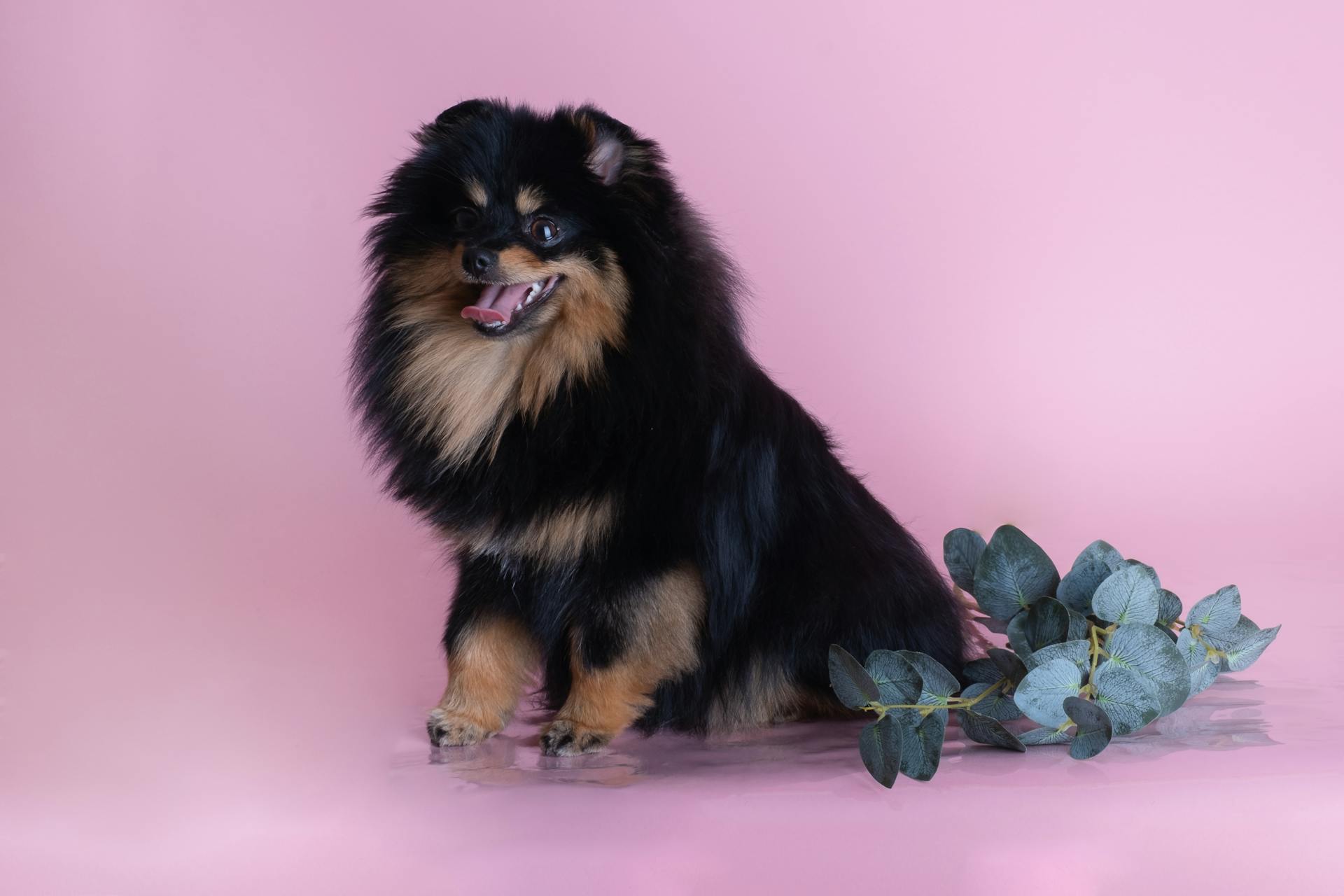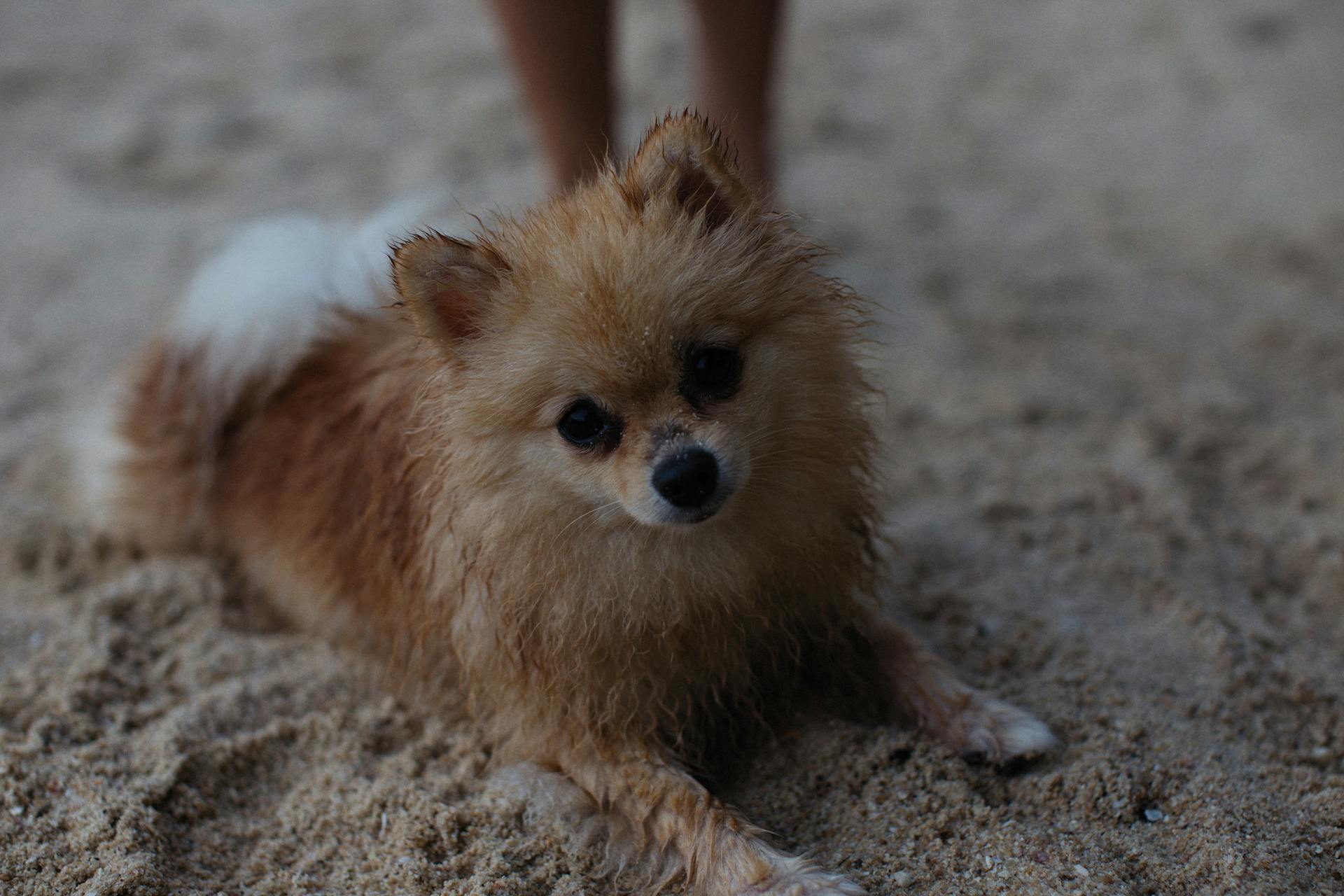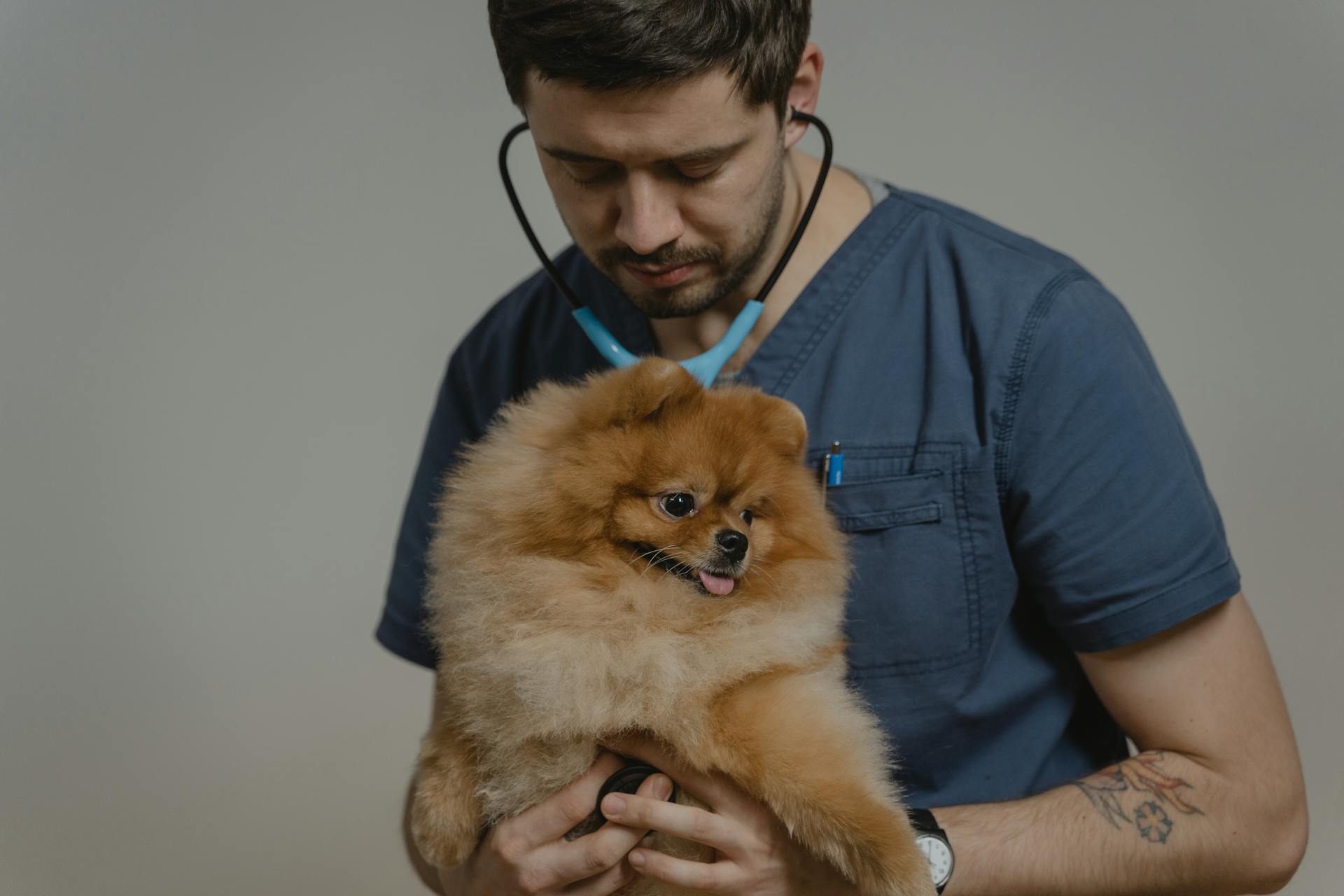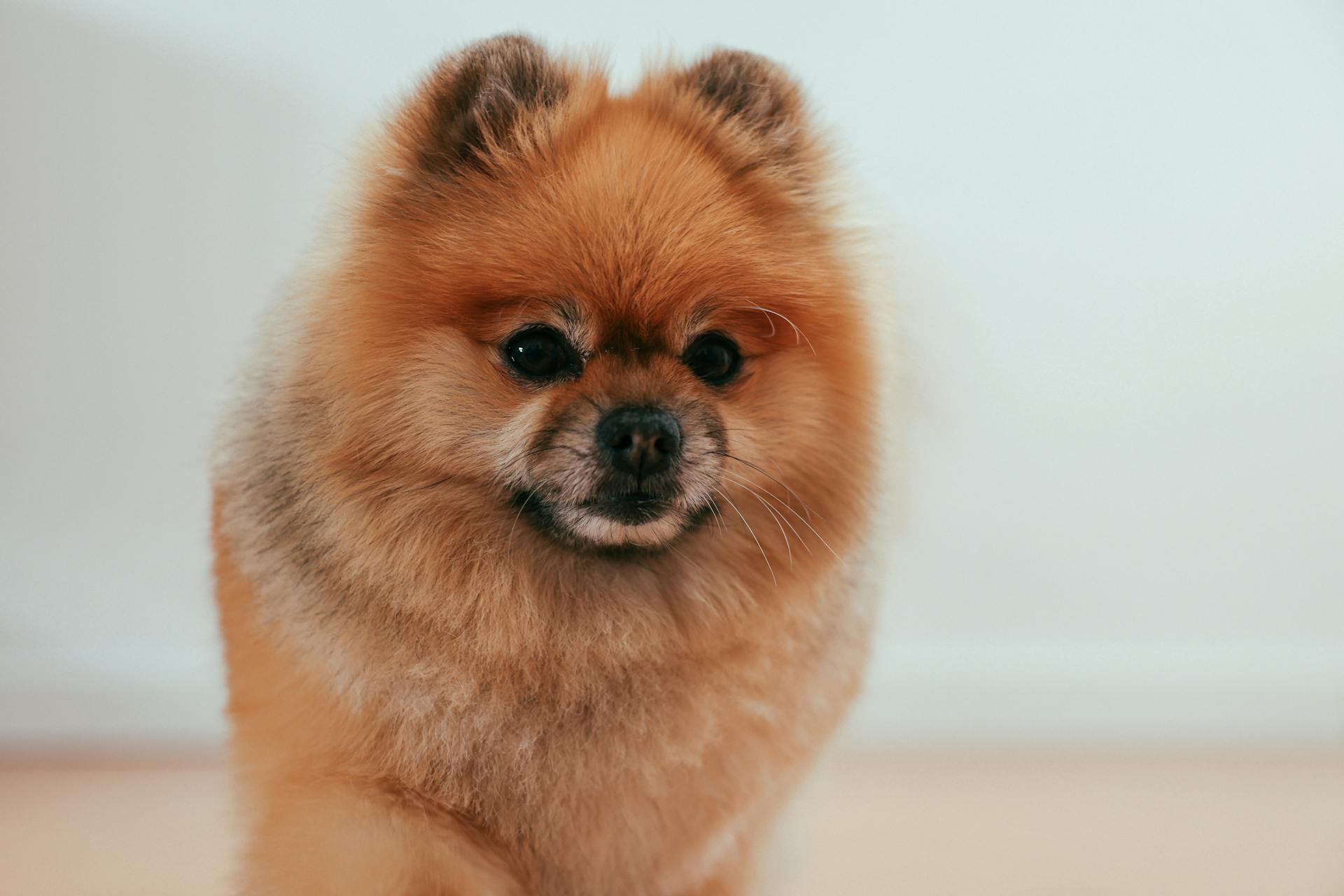
The Pomeranian and Toy Poodle mix, also known as a Pomapoo, is a small, adorable dog that makes a great companion for many families.
Their small size, typically weighing between 4-7 pounds, makes them perfect for apartment living or for those who don't have a large yard.
This mix is a cross between a Pomeranian and a Toy Poodle, and as such, they often inherit the low-shedding coat of the Poodle, making them a great choice for those with allergies.
Their intelligence and trainability, inherited from the Poodle side, make them relatively easy to train and housebreak.
Pomeranian and Toy Poodle Mix
The Pomeranian and Toy Poodle Mix, also known as the Pomapoo, is a unique and lovable breed.
These tiny dogs are a mix between a Pomeranian and a Toy Poodle, and they can live just about anywhere, including smaller homes and apartments.
They typically stand eight to 10 inches off the ground and weigh between five and 15 pounds.
Adult Pomapoos can live for up to 14 years, making them a long-term companion.
They are both lapdogs and companion dogs, and they love nothing more than sitting on a warm lap.
Their coats can include colors such as black, brown, white, and tan, and they have a fluffy and curly texture.
Here are some key characteristics of the Pomapoo breed:
Pomapoos are friendly, gentle, outgoing, and playful, making them a great addition to any family.
They are highly intelligent and respond well to positive reinforcement training, which should start when they're just eight weeks old.
With proper training and socialization, Pomapoos can thrive in most homes, but they do best in households with adults and older children.
Their small size means they can be injured easily, so it's essential to handle them gently and provide a safe and comfortable environment.
Appearance and Size
These adorable Pomeranian and Toy Poodle mixes, also known as Pomapoos, typically weigh between 5 to 15 pounds.
Their height can vary, but they usually stand between 8 to 10 inches tall at the shoulder. They're small enough to fit in your hands and need extra small and small-sized products their entire lives.
Their coats can be a mix of curly and dense, with a variety of colors including red, brown, black, cream, and brindle. They often have a fluffy double coat that requires regular brushing to prevent matting.
Size
Pomapoos are tiny dogs, ranging from 5 to 15 pounds. This size can vary depending on their parents, but they're generally on the smaller side.
Their height is also quite compact, standing between 8 to 10 inches tall at the shoulder. This makes them perfect for lap dogs or pocket-sized pups.
These small dogs are easy to carry around and require extra small and small-sized products throughout their lives. They're so tiny, they might even be smaller than your cat!
Worth a look: Tiny Puppys
Coat & Colors
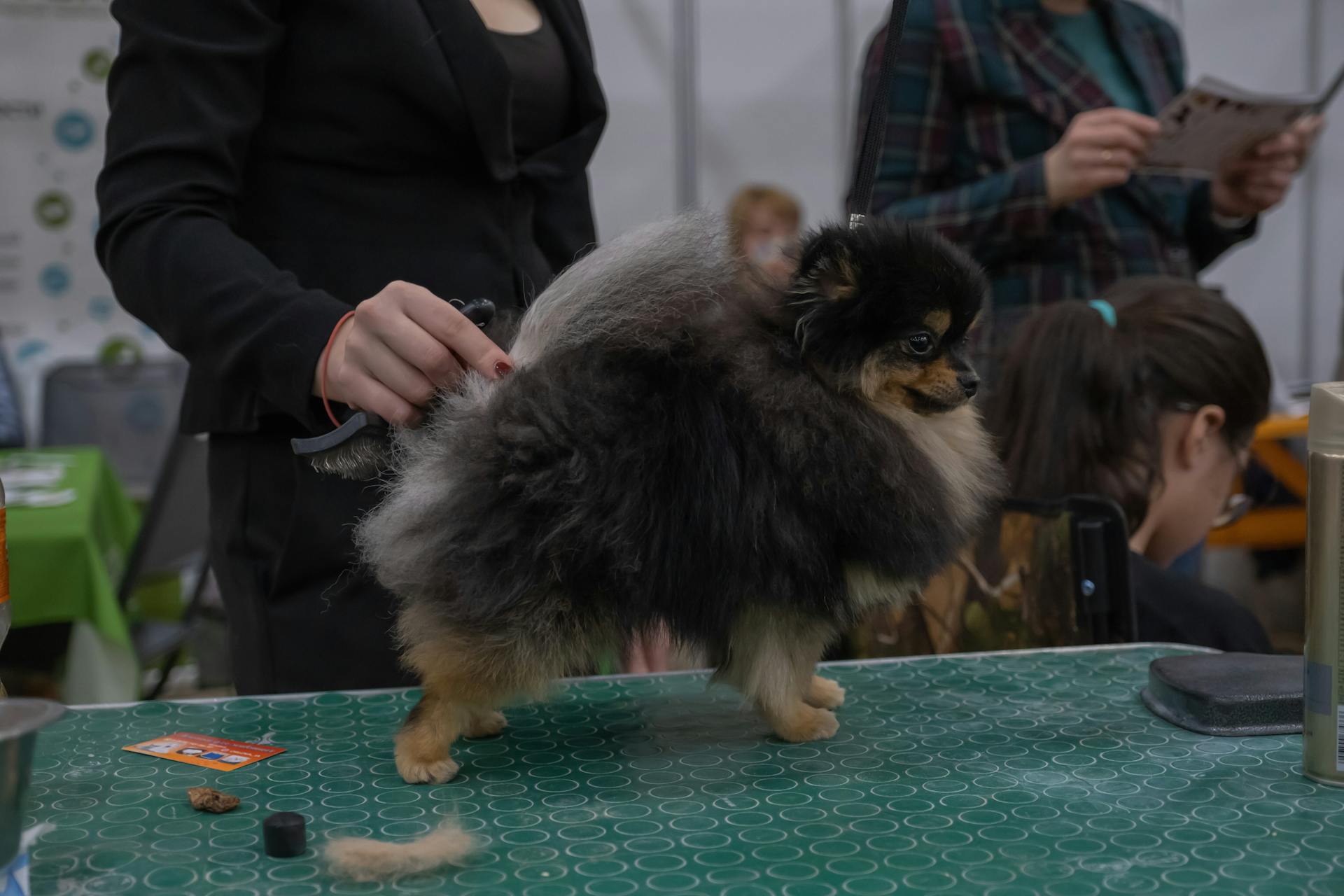
Pomapoos come in a wide range of colors, including brown, black, red, cream, brindle, fawn, sable, and more.
Their coats can be solid colored or have mixed colors, making each pup unique. Their coats can also be prone to matting, so daily brushing is a must to keep them tangle-free.
Pomapoos have a thick, double coat that's a mix of the Pomeranian and Poodle breeds. This coat can be dense and wavy, with a curly low-allergen coat possible if they inherit the toy poodle trait.
These dogs are not heavy shedders, but they still require regular grooming to remove tangles and mats. A few times a week of brushing should keep their coats looking their best.
Their coats can be unpredictable, taking on traits from either the Pomeranian or Poodle side of the family. Some Pomapoos may have the smooth, fluffy hair of the Pomeranian, while others may have the curly, wavy coat of the Poodle.
Temperament and Personality
Pomeranian and Toy Poodle mixes, also known as Pomapoos, are known for their clever and snuggly nature. They're fast learners and love to be the center of attention, making them stellar students when it comes to training.
These dogs are incredibly intelligent, with a high potential for learning new tricks and behaviors. They're also very affectionate and friendly, getting along well with people, children, and other animals.
Pomapoos tend to be very loving and bond tightly with their families, often craving playtime and attention. They're also gentle and eager to please, making them a great fit for first-time pet owners.
In terms of exercise needs, Pomapoos require low to moderate exercise, making them a great fit for apartment living. However, they do need regular grooming to prevent matting and tangling of their curly, medium, or short coats.
Here are some key characteristics of Pomapoos:
Overall, Pomapoos make wonderful pets for those who are willing to provide them with the attention and care they need. With their clever nature, affectionate personalities, and low exercise needs, they're a great fit for many families.
Living Needs and Care
Pomapoos are adaptable to apartment living, but they'll still need regular attention and playtime to stay happy and healthy. They thrive on interaction and can get playful, so be prepared for some fun times.
A daily walk or 30 minutes of exercise is sufficient for these tiny puppers, but they don't fare well in extreme temperatures. You can also try increasing the number of walks if your Pomapoo can handle more activity.
Pomapoos have small bladders and may need to use the bathroom frequently, so potty training can be a bit tricky. Using training pads around the house can help show them where it's okay to go.
Here's a quick rundown of Pomapoo exercise needs:
Pomapoos are prone to separation anxiety, so it's best to avoid leaving them alone for extended periods. And, as they love to snuggle, be prepared to carry them home after long walks – they can get pretty tired!
Living Needs
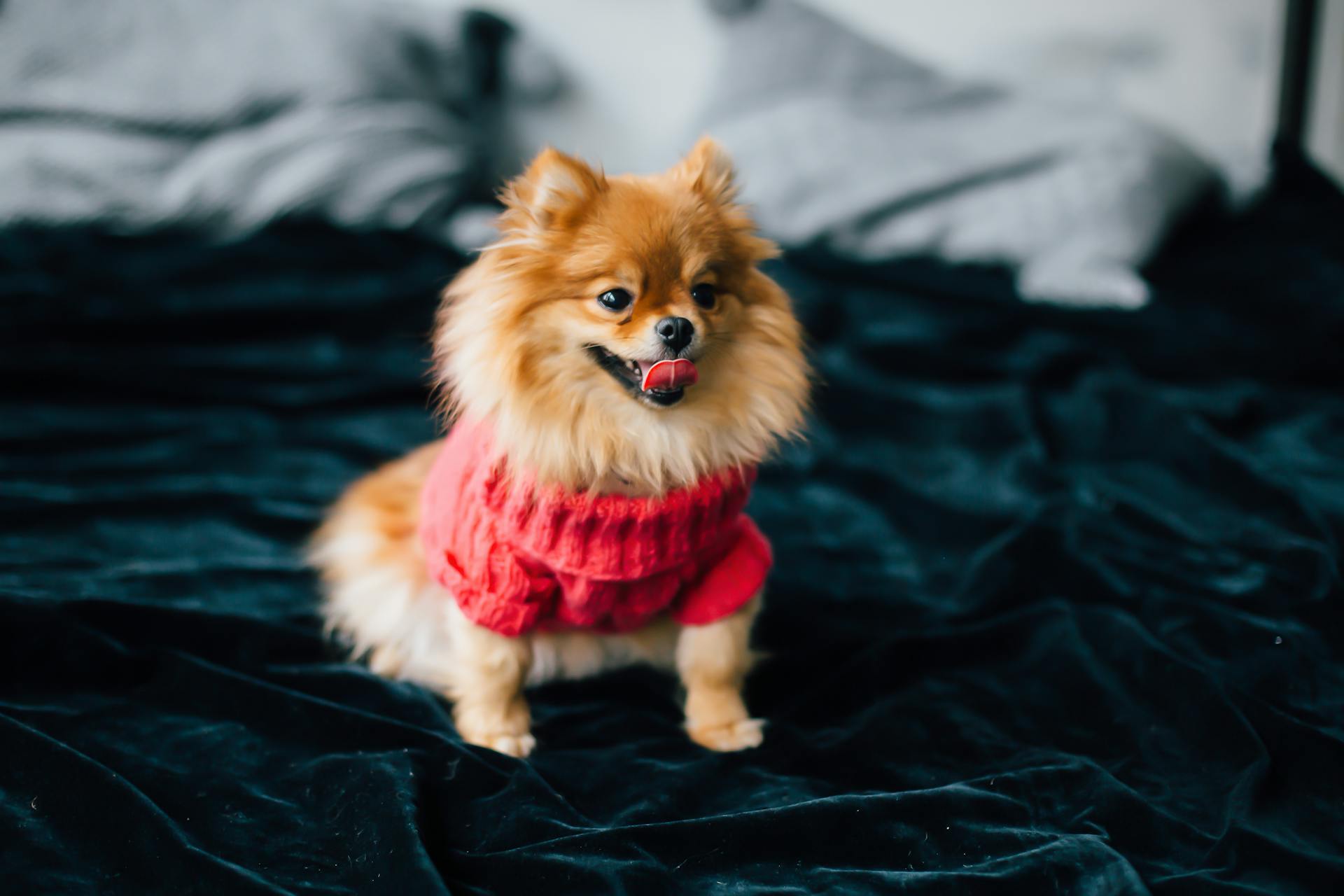
Pomapoos are adaptable to living in apartments or tiny homes, but they'll probably spend most of their time indoors on their favorite chair.
They thrive in homes with other pets, including cats, and are generally low-maintenance when it comes to exercise. A daily walk or 30 minutes of exercise a day is sufficient to keep them happy and healthy.
Pomapoos bond strongly with their family, so they need plenty of attention and dedicated playtime with interactive toys and puzzle games. This will help prevent boredom and destructive behavior.
They have short legs and can tire easily, so it's essential to keep their exercise sessions short. You might even need to carry them home if they get too tired on long walks.
To prevent joint injuries, consider outfitting your home with doggy stairs or a ramp to help them climb onto furniture safely.
For another approach, see: Toy Dogs for Short Crossword
Caring for a Pomapoo
Caring for a Pomapoo requires attention to its unique needs. They are apartment-friendly and can thrive in tiny homes, but they do need regular exercise, about 30 minutes a day, to stay happy and healthy.
A daily walk or short playtime should suffice, but be mindful of extreme temperatures, as they don't fare well in hot or cold weather. You can also use doggy stairs or a ramp to help them climb on and off furniture, which will keep their joints safe.
Pomapoos have small bladders and may need to use the bathroom frequently, so it's essential to establish a regular potty training routine. You can use training pads around the house to help them learn where to go.
To keep your Pomapoo's coat healthy and mat-free, brush them at least every other day. They may also need an occasional wash, and regular ear cleaning, nail trimming, and dental care.
Here's a quick rundown of what to expect:
Remember, Pomapoos are social animals and thrive on attention, so be prepared to spend quality time with your furry friend.
Poodle Mix Shedding
Living with a Poodle mix requires some understanding of their shedding habits. The Pomapoo, a mix of a Poodle and a Pomeranian, sheds very little.
Poodles are known for being low-shed and hypoallergenic, which is why the Pomapoo inherits this trait. This means you won't have to worry about excessive hair around the house.
The amount of shedding can vary depending on the individual dog, but overall, Poodle mixes like the Pomapoo are a great choice for people with allergies.
Health and Training
Training your Pomapoo starts early, even as young as eight weeks old. This is crucial to establish positive habits and expected behavior.
Pomapoos have a stubborn streak that can worsen without proper training, so it's essential to begin training right away. They thrive on training that involves positive reinforcement and rewards, such as giving them treats and affection when they respond to a command.
To potty train your Pomapoo, follow a set routine and take them outside as soon as you see them looking for a place to use the bathroom. They have a strong memory and can quickly learn to use the bathroom in the same spot.
Pomapoos are social animals and love taking trips to the dog park, so be sure to socialize them with other dogs, animals, and new people when they're young. This will help them retain a friendly attitude and know proper behavior towards others.
Recommended read: When Do Toy Poodles Go into Heat
Pomapoo Health Problems
Pomapoos are prone to epilepsy, a serious condition that can affect their quality of life. With regular check-ups, you can catch any potential issues early on.
They're also at risk of developing patellar luxation, a condition that affects the kneecap. This can be painful for your Pomapoo, so it's essential to monitor their behavior and watch for any signs of discomfort.
Tear staining is another issue that can affect Pomapoos, caused by the moisture from their eyes draining onto their fur. Regular cleaning with pet wipes or products can help prevent this.
With proper care and regular check-ups, your Pomapoo can live for up to 14 years. Small dogs like the Pomapoo tend to live longer than larger breeds.
Broaden your view: How Long Do Jack Russels Live
Training a Pomapoo
Training a Pomapoo requires starting early, even as young as eight weeks old. This helps establish positive habits and expected behavior.
Pomapoos have a strong memory and can quickly learn to use the bathroom in the same spot. You should follow a set routine for potty training, taking the dog outside as soon as you see it looking for a place to use the bathroom.
Pomapoos are social animals and thrive on interaction, so socializing them with other dogs, animals, and new people is advisable. This helps them retain a friendly attitude and know proper behavior towards others.
Positive reinforcement is the best approach for training a Pomapoo. This can include giving the dog small treats when it responds to a command and showering it with affection.
Pomapoos can be litter trained, as well as trained to go outside. They are fast learners and will understand the concept of going away from living space to relieve themselves.
To potty train a Pomapoo, start at about eight to ten weeks, and be patient and supportive of your pup. Accidents will happen, but with persistence, your Pomapoo will learn to go to the bathroom outside.
Here are some key tips for potty training a Pomapoo:
- Give the dog food and water, then take it outside as soon as you see it looking for a place to use the bathroom.
- Use training pads around the house to show the dog where it can use the restroom.
- Be prepared for the dog to need to use the bathroom mere minutes after drinking.
- Follow a set routine for potty training to help the dog learn quickly.
Are Pomapoos Hypoallergenic?
Pomapoos are considered hypoallergenic due to their Poodle genetics. This makes them a good choice for people who suffer from dog allergies.
Their low-shedding coat is a key factor in their hypoallergenic status, but it's essential to remember that everyone's sensitivities are different.
Discover more: Are Toy Poodles Hypoallergenic
Breeders, Costs, and Rescues
If you're considering bringing a Pomeranian and Toy Poodle mix, also known as a Pomapoo, into your life, you'll need to decide between working with a breeder or adopting from a rescue group.
Prices for Pomapoos can range from around $500 to over $2,500, depending on factors like age, quality of bloodlines, and pedigree. Higher quality bloodlines and pedigree will cost more.
Reputable breeders will require a contract to adopt a dog and will not sell to pet stores. You can look up AKC registered breeders, ask your veterinarian, or connect with dog clubs in your area to get word-of-mouth recommendations.
Older dogs and adults can be found in shelters, and they often cost less than puppies. An older dog can be a great choice for people who don't want a puppy but have room in their hearts and home for a canine companion.
Breeders & Costs
Pomapoos can range in price from around $500 to over $2,500, with younger puppies typically costing more.
Reputable breeders are essential when looking for a Pomapoo, and you should ask about their experience, previous litters, and health testing.
Discussing references and care recommendations with a breeder can give you a better sense of their qualifications and commitment to the health and well-being of their dogs.
Reputable breeders will not sell to pet stores and will require a contract to adopt a dog, so make sure to ask about this before making a decision.
You can find reputable breeders by looking at the AKC registered breeders list, asking your veterinarian, or connecting with dog clubs in your area.
Broaden your view: Health Issues with Toy Poodles
Rescues & Shelters
You can find Pomeranian Poodle mixes in shelters and rescue groups, but they may have a lengthy application process and limited resources. Many breed-specific rescues for Pomeranians and Poodles exist, as well as municipal shelters and local rescue groups.
Be sure to research rescue groups thoroughly, looking for transparency about their mission, adoption process, and resources. Check their social media pages and ask questions to get a sense of their operations.
Prices for rescue dogs vary based on availability, location, and age, with older dogs and adults costing less than puppies. Older dogs can make wonderful companions for people who don't want a puppy but still want a furry friend.
Consider adopting an older dog from a shelter, as they often have more availability and need loving homes. Taking an older dog home can give them a new lease on life and provide a loving companion for you.
Frequently Asked Questions
Can you breed a Pomeranian with a Toy Poodle?
Yes, a Pomapoo is a crossbreed between a Pomeranian and a Toy Poodle, resulting in a unique and adaptable companion. They're ideal for families with older children and smaller living spaces.
Featured Images: pexels.com
